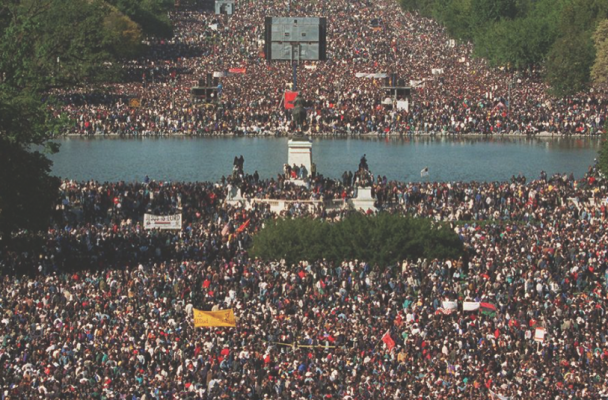The Million Man March, the African American community unites

This year’s Million Man March crowd. Photo by wsbtv.com
By Meghan Brown // Staff Writer
I stepped off the metro and followed the crowd. My friend from Syracuse rode the bus to Washington, D.C., and I was texting to see where she was. In a nervous haze, I crossed the street without looking–I couldn’t see anything anyway– grabbed my companion’s hand and found us walking against traffic, an unlawful, punishable offense on most days, but today there were tens of thousands more people in the city than usual.
The number of people instantly confused me and before I knew it, I followed a crowd and found myself standing in a line for the Annual Taste of D.C. event occurring that same weekend. We finally broke away from that crowd and followed a group of people wearing “Justice or Else” shirts. When we made it to the National Mall, a wave of unity and compassion swept over us. It was as if we crossed an invisible barrier that separated the march from the rest of the city. The environment had noticeably changed.
That day was Oct. 10, 2015, the twenteith anniversary of the Million Man March, held in the nation’s capital, Washington, D.C., where thousands of people from all lifestyles came to participate. Early in the morning participants marched from around D.C. to the national mall where the families of Sandra Bland, Trayvon Martin and Michael Brown spoke on the stairs of the Capitol building. Around 1 p.m., the event’s organizer, Louis Farrakhan, began to speak.
Participating in the event was a life altering experience. It was refreshing to see many kinds of people stand united against injustice and brutalities against marginalized communities across the country. When Minister Farrakhan spoke, he did not only focus on injustice against black men but he also mentioned the injustices against Native Americans, veterans and women. In fact, he acknowledged that women were the backbone of the struggle and the only reason we were here was because of the sacrifices of women. This was a shock to most in attendance because Minister Farrakhan and the Nation of Islam prohibited women from attending the first march.
The first ever Million Man March, held Oct. 15, 1995 in the nation’s capital, had a message for black men to pledge self-reliance and commit to their families and communities. Millions of men gathered in unity to hear Minister Farrakhan’s message and empower each other. It was a historical event. Unfortunately, women were not encouraged to attend. Farrakhan thought women would be a distraction and really wanted men to pay attention to the matter at hand. Luckily, in this year’s march, there was nothing to stand in the way of everyone attending.
As soon as I walked to the National Mall and joined the march, I noticed that there was not just one kind of person in the crowd. There were people of all ages, all races and ethnicities, all occupations and all genders. The only thing we all had in common was that we all wanted justice for marginalized citizens within our communities. We were there because we were all united by the fact that we all wanted change.
While standing in the crowd, I had never felt more in unison. I stood by complete strangers and felt like I was standing with family. The unity and empowerment in the crowd spread like wild fire.
This was my first march. It was my most public display of activism. It was participation in something that nearly brought me to tears. Listening to the stories of strength from the speakers made it hard to stand there before them and not feel compelled to do more. To help more. To speak up more. To be more.
The march filled the air with hope, perseverance, opportunity, empowerment, love and unity that day. After attending the event, I went home feeling inspired to do more. I felt inspired to speak up more and to support the causes in which I believe. There was more diversity and unity than I had ever seen before that day. There was more love and hope. There was a family of thousands of people with thousands of different backgrounds. There was confidence that a change might come, maybe not immediately, but eventually. However, there was assurance that nothing can change if we stand divided. Only those united can change the world.